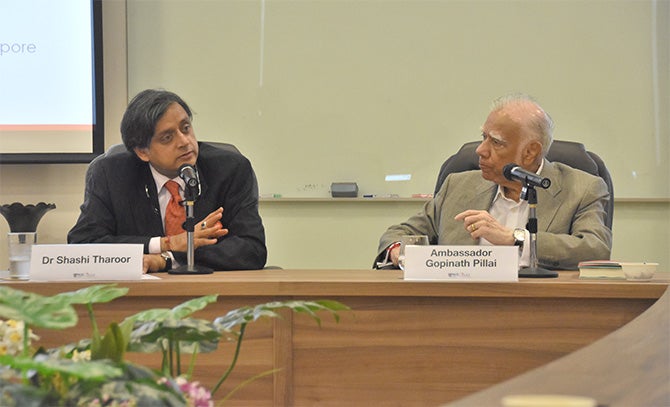
| Event Title: | ISAS Closed Door Session |
| Topic: | India in the 21st Century |
| Date/Time: | 26 April 2018 | 13:00 - 11:04 |
| Venue: | ISAS Board Room, Level 9, 29 Heng Mui Keng Terrace |
| Speaker/s: | Dr Sashi Tharoor |
| Description: | Dr Shashi Tharoor, Lok Sabha Member of Parliament for Thiruvananthapuram Constituency and Chairman, Parliamentary Standing Committee on External Affairs, India, was invited to ISAS for a closed door session on ‘India in the 21st Century’. This session was moderated by Ambassador Gopinath Pillai, Chairman, ISAS and Ambassador-at-Large, Ministry of Foreign Affairs, Singapore.
Ambassador Pillai began the session by welcoming the audience and thanking Connected to India for arranging the session. He also narrated an anecdote on learned Indians and put forth the question of why talented younger members of India’s Congress party did not get much exposure. The attendees comprised representatives from the Ministry of Foreign Affairs, ISAS research staff as well as representatives from the High Commission of India to Singapore. Dr Tharoor began by stating that he would focus on four themes for his presentation, two domestic and two international. The first domestic theme was that of development. Dr Tharoor highlighted that every single Lok Sabha MP represented a majority of voters living on less than USD 2 a day and all MPs were accountable to these electorates. Therefore development was a critical issue as everything else was secondary to the provision of food, housing, jobs and opportunities. The second domestic theme touched on by Dr Tharoor was of the state of pluralism and religious harmony in the country. Dr Tharoor narrated the example of the religiously diverse nature of the armed forces during the 1971 Bangladesh Liberation war as an example of India’s historically secular nature. He opined that although there had traditionally been a consensus on ‘how to disagree’ in this debate, the ‘ground rules’ were being challenged in recent years. The first international theme covered by Dr Tharoor was of India’s place in the world. He explained that under Prime Minister Manmohan Singh, there was a doctrine of orienting Indian foreign policy itself towards the principal and overriding responsibility of the government to its people. He stated that Prime Minister Modi had carried on with this policy. Dr Tharoor opined that India has not fully tapped its potential in international relations despite having good relations with several countries (for example, India did not play a role in the Iran agreement despite cordial relations with both America and Iran). Dr Tharoor’s second international theme was that of the neighbourhood, which he described as being of ‘colossal importance’ to India. He highlighted that the key to India’s relations in the neighbourhood was conceding ‘asymmetrical relations’ i.e. giving more than it received. The interactive session involved choice questions from the audience. The topics discussed included the Congress party’s projections for the 2019 general elections (including the role of the Congress and regional parties in the opposition), the dysfunctionality of Indian Parliament, India’s policy towards China, what could have been done differently since 1990 to alleviate poverty, and whether the Congress needed to reclaim nationalism while dealing with its own dynastic hierarchy. |


